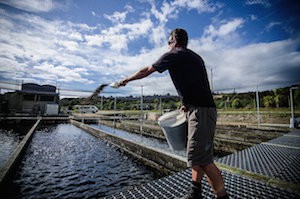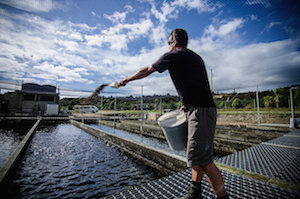
New Zealand government, research and commercial groups are aligning with international salmon experts to make salmon farming here even more sustainable. The $5.2 million project is spearheaded by Nelson-based New Zealand King Salmon and aims to fully understand the specific dietary requirements of King salmon.
To conduct the programme, New Zealand King Salmon has brought together a research group comprising Seafood Innovations Ltd (SIL), Nelson’s Cawthron Institute, the Nelson Marlborough Institute of Technology (NMIT) and Danish feed producer BioMar.
The nutritional requirements of the rare King Salmon species – farmed predominantly in New Zealand – differ considerably from the common Atlantic salmon, trout and other salmon species farmed elsewhere in the world. Currently global suppliers produce feed based on environmental and economic considerations for the latter species.
New Zealand King Salmon Chief Operating Officer Rubén Álvarez says the company is committed to best practice and the highest quality product and that drives the need to fully understand the species’ dietary requirements.
The aim of the world-first study is to develop a high-quality, species-specific feed that improves vastly on the generic products currently available. Commercial interests are providing half the funding for the four-year project with SIL, a research partnership supported by the Ministry of Business, Innovation and Employment providing the balance. SIL general manager Mike Mandeno says the project is predicted to deliver an important range of key benefits. “While New Zealand salmon farming is already widely acknowledged as the world’s most sustainable, we would expect the research to deliver even greater advantages in this area. A King salmon-specific feed would also have commercial benefits for New Zealand producers in terms of exports, job creation and ultimately the profitability of the industry,” Mandeno says.
Cawthron Institute is a private research organisation and chief executive Professor Charles Eason says the project represents a robust commercial/research partnership. “We have put together a strong team including international experts from Europe and South America. Their skills combined with our own knowledge in fish nutrition, fish health and the development of specialist feeds will bring together the best scientific team to work alongside New Zealand King Salmon for the benefit of New Zealand,” Professor Eason says.
NZ King Salmon is the world’s biggest producer of farmed King salmon. A spokesperson says: “We produce 55% of New Zealand’s salmon and supply around 40% of the world’s King salmon, which is renowned for its high levels of healthy Omega-3s and superior culinary attributes. With our premium Ōra King brand in demand world-wide and Regal leading the category in New Zealand, we need to ensure we can build on our already strong sustainability credentials. This is increasingly important as consumers and chefs focus on the provenance of food.”
Danish company BioMar is a leading supplier of high performance fish feed to the aquaculture industry supplying products to around 60 countries and for more than 30 different fish species. Currently, global suppliers produce feed based on environmental and economic considerations for Atlantic salmon but in the wild, King salmon have a different habitat, diet and nutritional requirements. The research project sets out to define what those differences are so as to enhance aquaculture feed for the fish while at the same time reducing its environmental footprint.



